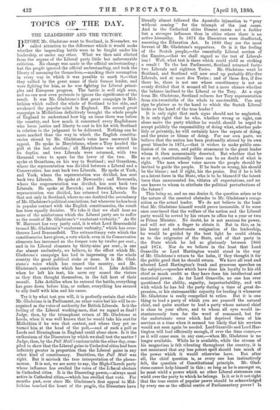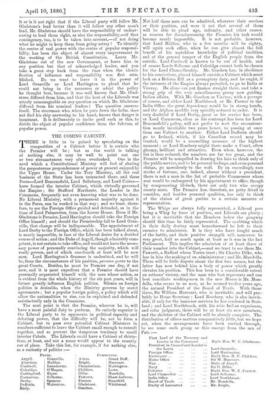TOPICS OF THE DAY.
THE LEADERSHIP AND THE VICTORY.
EFORE Mr. Gladstone went to Scotland, in November, we called attention to the difference which it would make whether the impending battle were to be fought under his leadership, or under any other. What we then said elicited from the organs of the Liberal party little but unfavourable criticism. No change was made in the official understanding ; but the people ignored the official understanding, and took the liberty of assuming for themselves,—marking their assumption in every way in which it was possible to mark it,—that they rallied to the great name of their former leader, and were fighting for him, as he was fighting for Liberal princi- ples and European progress. The battle is well nigh over, and no one now even pretends to ignore the significance of the result. It was Mr. Gladstone's first great campaign in Mid- lothian which rallied the whole of Scotland to his side, and awakened the popular mind in England. His second great campaign in Midlothian definitively brought the whole people of England to understand how big an issue there was before the country, and how much it concerned every Englishman who loves justice and liberty to cast in his lot with Scotland in relation to the judgment to be delivered. Nothing can be more marked than the way in which the English constitu- encies stirred by Mr. Gladstone's voice have answered his appeal. He spoke in Marylebone, where a Tory headed the poll at the last election ; all Marylebone was stirred to its depths, and two Liberals were returned, with two thousand votes to spare for the lower of the two. He spoke at Grantham, on his way to Scotland ; and Grantham, where the representation was divided between a Liberal and a Conservative, has sent back two Liberals. He spoke at York, and York, where the representation was divided, has sent back two Liberals. He spoke at Newcastle ; and Newcastle, where the respresentation was divided, has sent back two Liberals. He spoke at Berwick ; and Berwick, where the representation was divided, has returned two Liberals. So that not only in Scotland, where no one doubted the ascendancy of Mr. Gladstone's political convictions, but wherever he has been in popular contact with the English constituencies, the result has been equally decisive. We take it that we shall hear no more of the misfortunes which the Liberal party are to suffer as the result of Mr. Gladstone's" exuberant verbosity." As Sir W. Harcourt has very justly said, it is what Lord Beaconsfield termed Mr. Gladstone's "exuberant verbosity," which has over- thrown Lord Beaconsfield. The extraordinary vote which the constituencies have given, a vote which, even in its Conservative elements has increased on the former vote by twelve per cent., and in its Liberal elements by thirty-nine per cent., is one due almost exclusively, we believe, to the effect which Mr. Gladstone's campaign has had in impressing on the whole country the great political stake at issue. It is Mr. Glad- stone's voice which has roused the country, and Mr. Gladstone's conviction which has carried it. Like Achilles when he left his tent, his mere cry scared the victors as they then thought themselves, in the full heat of their assault. Like Achilles when he entered the battle, everything has gone down before him, or rather, everything has seemed to ally itself with him and his cause.
Try it by what test you will, it is perfectly certain that while Mr. Gladstone is in Parliament, no other voice but his will be re- cognised as the voice of authority for British Liberals. Is it the feeling of the Liberal working-men, that we regard as final ? Judge, then, by the triumphant return of Mr. Gladstone at Leeds, when it was well known that he would take his seat for Midlothian if he won that contest, and where they yet re- turned him at the head of the poll,—and of such a poll as Leeds and Birmingham in England could alone show. Is it the enthusiasm of the Dissenters by which we shall test the matter ? Judge, then, by the Pall Mall's curious table the other day, com- piled to show that the Liberal gains in Cathedral cities had been infinitely greater in proportion than the Liberal gains in any other kind of constituency. Doubtless, the Pall Mall was right. But it mistook the true interpretation of the pheno- menon. It is not, we are sorry to say, the High-Church party whose influence has swelled the votes of the Liberal electors in Cathedral cities. It is the Dissenting power,—always most active in Cathedral cities,—which has swelled that vote. For months past, ever since Mr. Gladstone's first appeal to Mid- lothian touched the heart of the peqple, the Dissenters have literally almost followed the Apostolic injunction to "pray without ceasing " for the triumph of the just cause. And in the Cathedral cities Dissent exerts not a feebler but a stronger influence than in cities where there is no active hierarchy. In 1874 the Dissenters were disaffected, resenting the Education Act. In 1880 they are the most fervent of Mr. Gladstone's supporters. Or is it the feeling of the Scotch people,—the essentially Liberal section of the Empire,—that we shall regard as the test of Liberal- ism? Well, what test is there which could yield so striking a result ? To the last Parliament, Scotland returned forty- two Liberals and eighteen Tories. Mr. Gladstone went to Scotland, and Scotland will now send up probably fifty-five Liberals, and at most five Tories ; and of these five, if five there be, there is not one whose constituency is not so. evenly divided that it seemed all but a mere chance whether the balance inclined to the Liberal or the Tory. At a sign from Mr. Gladstone, Scotland reduces her Tory representation from six-twentieths of the whole to one-twelfth. Can any sign be plainer as to the hand to which the Scotch Liberal looks as the hand of the true leader ?
It is only right that such signs should not be neglected. It is only right that he who, whether wrong or right, can alone move the party whither he would, should be urged to accept publicly the responsibility of doing what, whether pub- licly or privately, he will certainly have the repute of doing, and the praise or blame of doing. For our own parts, we believe that the nation has been profoundly stirred by its own great blunder in 1874,—that it wishes to make public con- fession of its error, and public atonement to the great leader whom it then momentarily deserted. But whether that be so or not, constitutionally there can be no doubt of what is right. The man whose voice moves the people should be invited to guide the people. If he leads us wrong, his should be the blame ; and if right, his the praise. But if he is left as a latent force in the State, who is to be blamed if the latent force thus unaccounted for, vitiates all expectations, and no one knows to whom to attribute the political perturbations of the future ?
This being so, and no one denies it, the question arises as to the nature of the asserted obstacles to Mr. Gladstone's recog- nition as the actual leader. We do not believe in the least that Mr. Gladstone himself would prove inexorable, if he were once convinced that the welfare of the nation and the Liberal party would be served by his return to office for a year or two as Prime Minister. No doubt, he is not anxious for power, and will not stir a finger to obtain it. But in this, as in his hasty and unfortunate resignation of the leadership, he would be guided by the best light he could obtain as to the exigencies of the State, and of that party in the State which he led so gloriously between 1866 and 1874. Nor do we believe in the least that Lord Granville or Lord Hartington would stand in the way of Mr. Gladstone's return to the helm, if they thought it for the public good that he should return. We have all read and admired Lord Harlington's frank and generous speeches on the subject,—speeches which have done his loyalty to his old chief as much credit as they have done his intellectual and oratorical power. As for Lord Granville, no one has ever questioned the ability, sagacity, imperturbability, and wit with which he has led the party during a time of great de- pression, or his statesmanlike capacity for leading it whenever Mr. Gladstone is really compelled to retire. But it is one thing to lead a party of which you are yourself the natural chief, and quite another to lead a party whose natural chief is close to your elbow, and to whom all eyes would in- stantaneously turn for the word of command, but for the unfortunate error which had deprived them of his services at a time when it seemed too likely that his services would not soon again be needed. Lord Granville and Lord Har- tington will lead efficiently enough, if ever the time comes,— as it will come soon in any case,—when Mr. Gladstone is no longer available. While he is available, while the stream of his magnetism is felt vibrating throughout the country, it is not unnatural that any less potent spell should lose much of the power which it would otherwise have. But after all, the chief question is, as every one has instinctively felt, the question of Constitutional principle. Mr. Glad- stone cannot help himself in this ; so long as he is amongst us, he must wield a power which no other Liberal statesman can wield over the party to which he belongs. Is it or is it not right that the true centre of popular pewer should be acknowledged by every one as the official centre of Parliamentary power ? Is it or is it not right that if the Liberal party will follow Mr. Gladstone's lead better than it will follow any other man's lead, Mr. Gladstone should have the responsibility of endeav- ouring to lead them right, as also the responsibility,—if that contingency, too, is to be taken into account,—of not doing what he might to keep them from going astray ? To identify the centre of real power with the centre of popular responsi- bility, has been the object of almost every improvement in the working of the British Constitution. Leave Mr. Gladstone out of the new Government, or leave him in any position but that of acknowledged leader, and you take a great step back from the time when the identi- fication of influence and responsibility was first esta- blished. Do we want to leave it in the power of Lord Granville or Lord Hartington to plead that he could not bring in the measures or adopt the policy he thought best, because it was well known that Mr. Glad- stone differed from him, and that the host of the Liberals was utterly unmanageable on any question on which Mr. Gladstone differed from his nominal leaders ? The question answers itself. The steersman who, when he puts down the helm, does not find his ship answering to his hand, knows that danger is imminent. It is deliberately to incite peril such as this, to divide the object of popular confidence from the fulcrum of popular power.



































 Previous page
Previous page